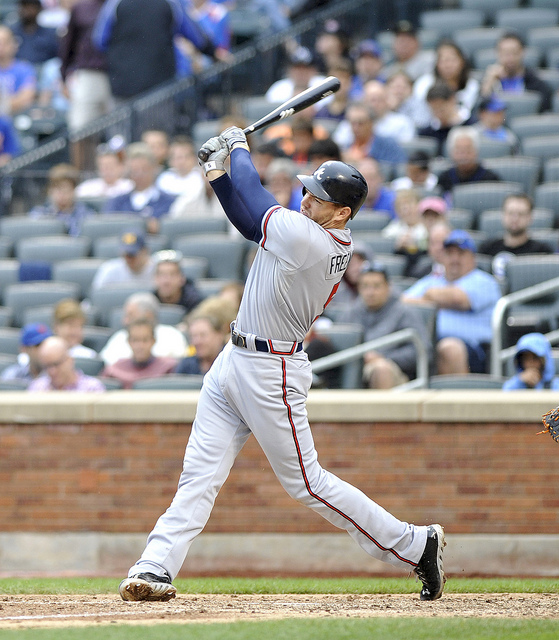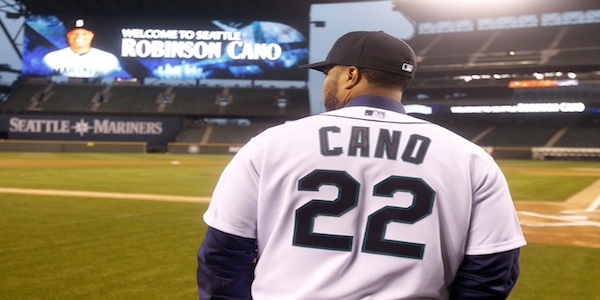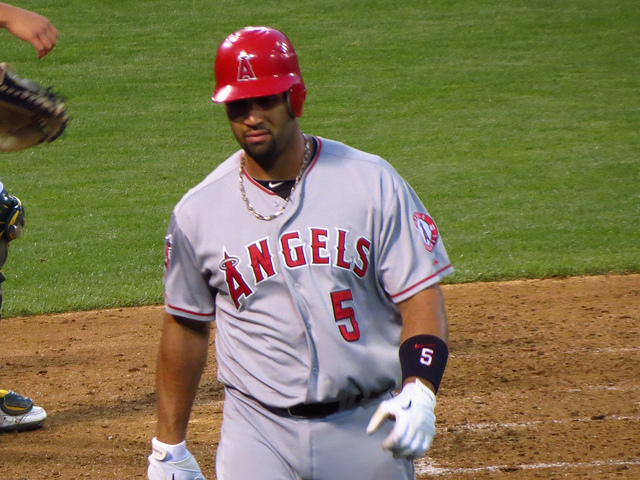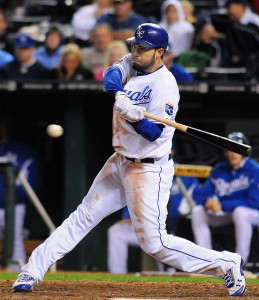2019 Fantasy Baseball: Final First Base Rankings

As the World Series nears its conclusion, it is a good time to start tieying the bow on the 2019 season. We are ranking the top 15 players at each position according to six categories, total points, and total points per game. We will use all of them to come up with a composite ranking for each player. We might even take a little glimpse into the future as some of these players will be changing uniforms next season.
In addition to ranking these players in order, we will also compare their individual category numbers with the average first baseman. We profiled all first basemen with 300 or more plate appearances on the season to come up with an average for each of the six categories. As usual, you want to consider not only whether they were above or below average, but by how much they were above or below average.
Average: .252/25 HR/69 Runs/76 RBI/2 SB/59 BB
Total Points= TB + Runs + RBI + SB + BB + HBP – SO – CS- GDP
Freddie Freeman—Atlanta Braves
Six Category: .285/38/113/121/6/87 (1st)
Total Points: 514 (1st)
Points Per Game: 3.25 (1st)
A large part of the calculus on where to draft a guy depends on your personal philosophy of building a roster. One philosophy involves simply picking the best players regardless od position. In that universe, Freeman is a borderline first rounder. The other philosophy considers the gap between Freeman and the next best first baseman. That is one area where total points helps. The gap is not that significant, so you may wait on taking your first baseman.
Carlos Santana—Cleveland Indians
Six Category: .281/34/110/93/4/108 (2nd)
Total Points: 492 (2nd)
Points Per Game: 3.11 (5th)
It’s hard to quantify batted ball luck. For years, Santana seemed to have so much bad luck that you just assumed it would always be that way. 2019 was different for Santana and it is to the point where it is hard to count on that happening again. Santana Is a perfect six category player with his 100+ walks every year.
Josh Bell—Pittsburgh Pirates
Six Categories: .277/37/94/116/0/74 (4th)
Total Points: 459 (5th)
Points Per Game: 3.21 (2nd)
The fun part about baseball is that it is easier to separate individuals from the team. The Pirates disappointed, came in last, and cleaned house. Still, there are positives you can always claim from a season and Bell was a huge positive. He went from being a good hitter with some power to being a very good power hitter. It sounds like semantics, but the numbers definitely tell the story.
Yuli Gurriel—Houston Astros
Six Categories: .298/31/85/104/5/37 (7th)
Total Points: 461 (4th)
Points Per Game: 3.20 (3rd)
Total points favors contact hitters. In particular, the ratio of walks to strikeouts is crucial. Gurriel doesn’t walk much and that hurts him in six category formats, but he makes consistent contact. A June adjustment turned his season around. Despite his ranking here, he will likely continue to be a second tier guy moving forward.
Peter Alonso—New York Mets
Six Categories: .260/53/103/120/1/72 (5th)
Total Points: 469 (3rd)
Points Per Game: 2.91 (7th)
One of the things I love about total points is that it doesn’t give extra credit or punish a player unnecessarily for a single category. Yes, Alonso hits a lot of homers and he doesn’t steal bases. The end result is that he exists right where he belongs. It will be interesting to see where his career goes from here.
Anthony Rizzo—Chicago Cubs
Six Categories: .293/27/89/94/5/71 (6th)
Total points: 449 (6th)
Points Per Game: 3.08 (6th)
For those looking for gaps in data you can see that the first and sixth best first basemen are separated by only about 50 total points. Rizzo is good at every category, but isn’t great in any of them. There is certainly a place for that on every fantasy team, but you have to ask yourself how much draft capital to put into that.
Max Muncy—Los Angeles Dodgers
Six Categories: .251/35/101/98/4/90 (3rd)
Total Points: 397 (8th)
Points Per Game: 2.82 (8th)
We normally don’t consider multiple position flexibility in these kinds of ranking systems, but it’s difficult to ignore. Muncy has second base eligibility in most formats. That obviously adds some value that the numbers don’t necessarily reflect. Muncy showed great patience and benefitted from that in six category formats, but the high strikeout totals hurt.
Jose Abreu—Free Agent
Six Categories: .284/33/85/123/2/36 (9th)
Total Points: 400 (7th)
Points Per Game: 2.52 (10th)
In days gone by, an Abreu would be a top-flight free agent target. He’s averaged 100+ RBI a season in his six-year career and led the league last season. Teams are more sophisticated in their analysis and they will see Abreu as a middle of the road first baseman overall. He probably has more value to the White Sox than anyone else, but we will see how he and his agent handle his search for a big contract.
Edwin Encarnacion—Free Agent
Six Categories: .244/34/81/86/0/58 (12th)
Total Points: 346 (11th)
Points Per Game: 3.17 (4th)
Technically, the Yankees hold a team option on Encarnacion, but I’d imagine they’d rather let him walk. We’ve seen the market for designated hitters plummet in recent seasons, so they may even be able to get him back for a fraction of the cost. All he does is hit 30 home runs and drive in 90+ a season. If he were healthy this year he would have hit 40+ and driven in more than 100.
Paul Goldschmidt—St. Louis Cardinals
Six Categories: .260/34/97/97/3/78 (8th)
Total Points: 383 (9th)
Points Per Game: 2.38 (12th)
On the one hand, the Cardinals gave up a lot to get Goldschmidt and didn’t expect a middle of the pack first baseman in return. On the other hand, they advanced to the NLCS, so it’s hard to argue with the results overall. He showed glimpses at different points in the season, but overall seemed a step or two off his game.
Matt Olson—Oakland Athletics
Six Categories: .267/36/73/91/0/51 (11th)
Total Points: 341 (12th)
Points Per Game: 2.69 (9th)
That’s two seasons in a row that a very good Athletics team has come up short to the Astros. Maybe if Olson hadn’t missed the first month or so they might have won 100 games. Maybe they would have had enough to catch Houston. He also might have been a top ten fantasy first baseman. Next year might be the year.
Rhys Hoskins—Philadelphia Phillies
Six Categories: .226/29/86/85/2/116 (10th)
Total Points: 374 (10th)
Points Per Game: 2.34 (13th)
I get it. When a team underperforms you want to point the finger at someone, but we often pick good players and question why they aren’t very good. The Phillies have a number of good players, but they didn’t have enough good players to get into the playoffs again. Can Hoskins get better? Sure, but all things considered he’s still good enough.
Albert Pujols—Los Angeles Angels
Six Categories: .244/23/55/93/3/43 (17th)
Total Points: 319 (14th)
Points Per Game: .244 (11th)
Pujols has become the posterchild for the ills of the mega contract. It seemed so wonderful when he signed the ten-year deal, but he has never been the player he was in St. Louis. Still, he drives in 80 or 90+ runs every season. He continues to stumble up the leaderboards in career categories to the point where he will be on the Mount Rushmore of all-time power hitters.
Christian Walker—Arizona Diamondbacks
Six Categories: .259/29/86/73/8/67 (15th)
Total Points: 325 (13th)
Points Per Game: 2.14 (16th)
Walker is the very definition of mediocre, but mediocre still has value in the big leagues and on your fantasy team. You can’t have an all-star at every spot, so you have to pick and choose your spots. If you can add a guy late in the draft capable of producing almost 30 home runs and 80 runs and RBI you take it.
Joey Votto—Cincinnati Reds
Six Categories: .261/15/79/47/5/76 (13th)
Total Points: 290 (18th)
Points Per Game: 2.04 (20th)
There is no accounting for the aging process. Some players age gradually and gracefully while others seemingly fall off the table. Just two years ago, Votto was an MVP candidate in the NL. Now, he is one of the third tier first basemen just barely hanging on. It’s one of the many reasons why we don’t count are Hall of Fame chickens before they hatch.




